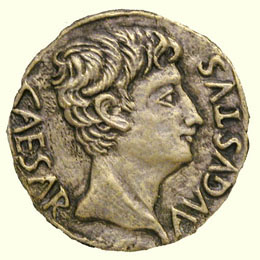29 Mar. Should Jews in Palestine pay taxes to the occupying power?
"Later, the Jewish leaders sent some Pharisees and Herodians to Jesus to trap him into saying something wrong [against the occupying Roman army]."
"They came to him and said, 'Teacher, we know that you are an honest man. You are not afraid of what other people think about you, because you pay no attention to who they are. And you teach the truth about God's way. Tell us; is it right to pay taxes to Caesar [the Roman Emperor] or not? Should we pay them or not?'"
"But knowing what these men were really trying to do, Jesus said to them, 'Why are you trying to trap me? Bring me a coin to look at.' They gave Jesus a coin, and he asked, 'Whose image and name are on the coin?' They answered, 'Caesar's.'"
"Then Jesus said to them, 'Give to Caesar the things that are Caesar's, and give to God the things that are God's.' And the men were amazed at what Jesus said."
(Mark 12:13-17)

During the days before his last Passover supper, the Pharisees and supporters of Herod Antipas tried to trick Jesus into saying something which would be seen as treason (and worthy of death) by the occupying Roman authorities. They asked him, “Is it right to pay taxes to Caesar or not?” (Mark 12:14)
Some years earlier, in 6AD, Judas the Galilean – a rabbi with his own group of followers (see Acts 5:37) – had led a rebellion against the Romans claiming that truly religious Jews shouldn’t pay taxes to Augustus Caesar, an earthly king who was worshipped as a god. His views were still widely held by Jewish nationalists.
Jesus asked the Pharisees to produce a denarius – a small silver coin with the Roman emperor’s head on it, worth about a day’s wages. Jesus showed them the portrait and said, “Give to Caesar the things that are Caesar’s, and give to God the things that are God’s” (Mark 12:17).
In Jesus's day, Jews used to pay the Jewish Temple Tax in pure silver coins that did not bear the name of any earthly king. Half shekels or shekels (the equivalent of two Roman denarii and four denarii), minted originally in Tyre but later issued by the Jewish authorities themselves, were the only coins acceptable to the priests, because they didn’t carry the portrait of an earthly ruler.
Jewish pilgrims had to change their denarii (showing Caesar’s head) into shekels in order to pay their half shekel Temple tax (see Mark 11:15). Jesus was making the point that coins bearing the Emperor’s head could be used legitimately by Jews to pay Roman taxes to the occupying forces, but coins without an earthly ruler’s portrait (the silver shekels used to pay the Temple tax) belonged to God.
This situation was unique to Jesus's day; but it's easy to spot the similarity to the situation in Palestine today: Should Palestinian Christians or Muslims working in Jerusalem, for example, pay taxes to the Israeli government when the occupying authorities then unjustly withhold the taxes that have been duly paid from the Palestinian Authority? To pay the taxes could be seen as supporting an illegal occupation; but to withhold payment could result in arrest and imprisonment by the occupying Israeli army.
Dilemmas present in the Palestine of Jesus's day (which many Jews in Israel today deny even existed!) are still present in the illegally-occupied Palestine of today.
The photo shows a silver denarius dating from the reign of Augustus Caesar (27BC - 14AD).
You can discover more about the rulers of Palestine in New Testament times @ https://www.thebiblejourney.org/…/…/the-rulers-of-palestine/
